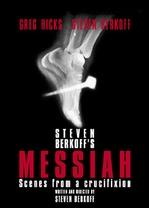Messiah - Scenes From A Crucifixion
In Berkoff's 'Messiah- Scenes From A Crucifixion' we have all the elements that one associates with Berkoff's theatrical style: Monochrome sets, stylised movements, physical acting, with few props! Berkoff is also known for bringing his own interpretation to a play, rather than just create what he would call a "boring rendition". He prefers to use a text to communicate his own ideas, and he makes no apology for doing so. What we have in 'Messiah' is Berkoff's interpretation of the text of the gospels.
Jesus is portrayed as both a revolutionary who loves his people and wishes to free them from Roman oppression and religious hypocrisy, and a Jesus who schemes to fulfil Old Testament prophesies about the Messiah in order to be accepted by the masses as their leader. He tells his disciples "The messiah will never come, so we have to create one".
Though Berkoff's Jesus plans one of the greatest deceptions imaginable, a fake resurrection from the dead, we are never quite sure of his motives. Is he an altruistic utopian dreamer or a dangerous megalomaniac? He wants to create a new society in his own image in which he will set the norms and be seen as God's mouthpiece, yet remains blind to the fact that he will only be replacing one religious authority with another, that of himself, God's 'chosen' messiah!
What comes through the play is Berkoff's own contempt for religious authority. Caiaphas is portrayed as a Christian Bishop who delights in wearing ornate robes and jewel encrusted crucifixes, listening to the sins of the faithful (Especially the sexual confessions), caressing choir boys behind the alter and performing masochistic acts of penance, while ignoring the gospel message of liberation for those who are oppressed. At the last supper where Jesus tells his disciples "Eat my body, drink my blood", Berkoff attacks religious dogma when Jesus exclaims, "You are not cannibals, can't you recognise a parable when one is thrown at you."
Where the script falters is in the strange mixture of the sublime and the ridiculous. After delivering the powerful 'Sermon On the Mount' Jesus turns to his disciples and enquires how his performance went down with the punters; When planning the crucifixion Christ tells his disciples "It will be a bastard on the big X"; Pontius Pilate says, after washing his hands of the crucifixion, "People love gestures - that's why they love the theatre', and so on.
The script does contain some beautiful writing, none more so than Mary's praise of the miracle of conception and childbirth. Here the gift of life is glorified without a hint of sugary sentiment. Blood, guts, and even the afterbirth are used to describe the intimate relationship between mother and child.
The physical style of Berkoff's direction means that the actors are never given an opportunity to grow into their roles. Every move is carefully devised to such an extent that all life seeps away from the performers. The physical stylised gestures come across as ostentatious and over mannered rather than elegant and imposing. This theatrical style makes it difficult to comment on the acting as you often feel that they are nothing more than marionettes in Berkoff's ham fisted production. This is never truer than in the opening scene where the actors stand like listless puppets as they literally wait to be manipulated into the required position.
Steven Berkoff gives a twenty-minute monologue as Satan, dressed in a black sleeveless leather full-length coat he hams his way through his own text. All stamping feet, and contorted facial expressions he hisses at the audience "Worship me". I was left wondering who is speaking this line, Satan or Berkoff himself. Greg Hicks does manage, despite the odds, to create a spirited portrayal of Jesus. It is he, and he alone that stops the evening from being one incredible bore.
What other critics had to say.....
FIONA MOUNTFORD for THE EVENING STANDARD says, "Offers rich dramatic pickings." LYN GARDNER for THE GUARDIAN says, "There are flashes of the old Berkoff magic...But the whole thing is plethied at such a ponderous pace ." PAUL TAYLOR for THE INDEPENDENT says, "Fans of his [Steven Berkoff] highly physical ensemble work and expressionistic magnification won't feel too shortchanged here." CHARLES SPENCER for THE TELEGRAPH "Messiah is yet another grotesque display of masturbatory self-indulgence from Berkoff, and one lives in dread of a Second Coming." BENEDICT NIGHTINGALE for THE TIMES says, "Some fine writing, as well as expert choreography, atmospheric music." SARAH HEMMING for THE FINANCIAL TIMES says, "Stylistically it is a rollercoaster ride, swooping from flights of lyrical writing to bursts of crude vernacular, and contrasting poised, poignant images with the blundering movements of a comic chorus."
External links to full reviews from popular press
The Guardian
The Independent
Daily Telegraph
The Times
Financial Times
Originally published on
